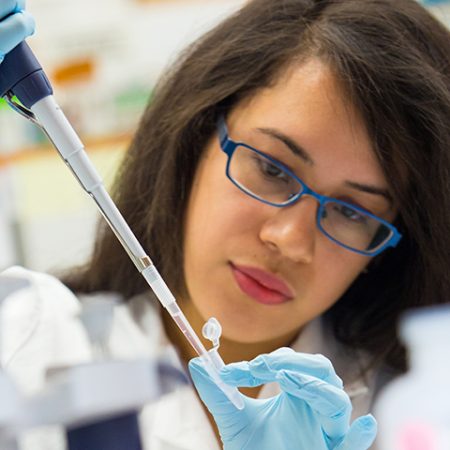
Every year, about 2,000 members of underrepresented minorities seeking science, technology, engineering or math doctorates in Florida apply to the McKnight Doctoral Fellowship Program. Only 50 are selected.
This year, the College of Medicine’s Department of Biomedical Sciences will welcome one of them: Connie Tenorio, who was an undergraduate research assistant for Professor Michael Blaber. She officially joins the program in late August.
“You usually hear that graduate school is a bad decision,” said Tenorio. “You get a lot more in debt, and you don’t have a job. But in STEM fields, you have good training, and you have a good chance of getting a good position somewhere. I think it’s really worthwhile for people to chase after that.”
For Tenorio, the chase has become less daunting. The McKnight fellowship will provide full tuition for three academic years, plus an annual stipend of $12,000. That’s in addition to funding provided by the College of Medicine that many other departments have difficulty offering prospective students.
“The FSU medical school still promises you payment for the whole time that you’re here,” she said. “I think that’s really important. Now, with this graduate fellowship money, I will also start paying off my student loans. I am really fortunate.”
She explains that her decision to join Biomedical Sciences was also about her colleagues.
“I have been working here as an undergraduate researcher for two years now,” said Tenorio, who this spring received a Bachelor of Science in biological science as well as chemical science, and a Bachelor of Arts in history. “I’ve gotten to know most of the faculty and the students that work here. I think there is a good interdisciplinary atmosphere where people collaborate.”
Despite her familiarity with the department, Tenorio anticipates new challenges as a graduate student. She has seen the impressive work done by her predecessor, Liam Longo, a grad student in the molecular biophysics program who works in the College of Medicine lab.
“I want to be able to have a record like he does: publishing papers and really making a contribution to science,” she said.
Her long-term career goals are equally ambitious: “You don’t really see a lot of minority professors. It would be nice to go to some university one day and have the opportunity to teach.”
Visit the Office of Graduate Fellowships and Awards to learn more about external awards and resources at FSU and for assistance during the application process.




